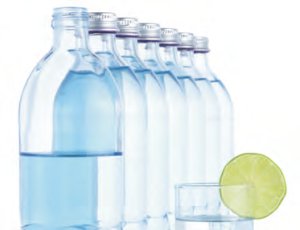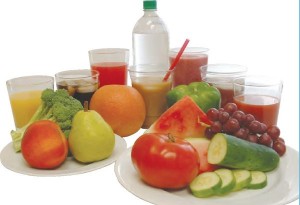How to Avoid Dehydration. Keep Hydrated Easily.
 Did you know that staying hydrated is important to health? Staying hydrated throughout the day helps keep your body working the way it should!
Did you know that staying hydrated is important to health? Staying hydrated throughout the day helps keep your body working the way it should!
Whether you’re an elite athlete, an avid exerciser, or more the spectator type, there’s one common fact: you can’t live long without water. Your body needs enough water to carry out many vital body functions and help you perform at your best. That’s why it’s so important to stay hydrated both on and off the field, says fitness expert, author and celebrity trainer, Kathy Kaehler.
“Proper hydration keeps our bodies running the way they’re supposed to,” she says.
Fulfilling Daily Water Needs
Being hydrated means the water you consume from beverages and foods is in balance with the water your body loses from perspiration, respiration, elimination and other body processes.
The term “water” can mean more than just plain drinking water in this case. It includes other liquids such as milk, fruit juices, sports drinks, and watery foods such as fruits and vegetables, and even beverages such as soft drinks, coffee, and tea.
The Institute of Medicine (IOM) recommends a daily water intake of 91 ounces for healthy women and 125 ounces for healthy men. Water needs increase with factors such as strenuous physical activity, hot and cold temperature extremes, and being ill with fever, diarrhea or vomiting. About 80% of water intake comes from beverages and about 20% comes from foods.
Know the Warning Signs of Dehydration
Thirst is often the first alert that your body needs water, but don’t rely on it alone when you work out hard or in hot conditions—drink “proactively” whether you’re thirsty or not. Other symptoms of dehydration include dry mouth, swollen tongue, weakness, dizziness, confusion, sluggishness or fainting. Dehydration may also lead to muscle cramps in athletes—another important reason to stay hydrated during rigorous exercise.
Often a urine check is the easiest way to judge hydration status. Pale yellow or almost colorless urine signals that you’re drinking enough. It’s time to drink up if your urine is small in volume, strong-smelling or dark in color (although taking certain vitamins and dietary supplements may also temporarily darken urine color).
Though rare, it’s possible to drink too much fluid and dilute the body’s sodium levels. This dangerous condition is called hyponatremia. But keep in mind that, for the vast majority of athletes, the biggest concern is dehydration caused by not drinking enough fluids. Work with your trainer, coach or sports nutritionist to determine the optimal amount of fluids for you.
Coaches and trainers can promote proper hydration by providing plenty of water, sports drinks and other preferred beverages at workout sessions, practices and events, and encouraging athletes to drink whenever they want, rather than waiting for a specific break time.
Hydration Tips for Working Out
Drink before, during and after a workout. Fitness expert Kathy Kaehler recommends a simple, easy-to-remember formula to stay hydrated when you exercise. “Drink a cup of water before, during and after workouts, and more if it’s hot or your workout is long,” says Kaehler. She also recommends sipping drinks throughout the workout, rather than drinking large amounts at one time. This practice is more effective for complete rehydration—rapidly drinking large quantities of fluids may actually reduce the amount of water your body retains by increasing urine production. So, it pays to slow down a bit every few minutes to take a swig from your sports bottle, then continue full speed ahead!
Use a “weigh-in” to replace water.To replace water lost from perspiration during a workout, the American Council on Exercise recommends weighing yourself before and after exercise and drinking 16-24 fluid ounces to replace every pound lost.
Pick a drink with appeal. Of course, plain water is a great source of hydration, but if you don’t like water, you can still stay hydrated by drinking milk, juice, soft drinks, coffee, tea, sports drinks, and other drinks. Choose what you like, so you’re more likely to drink up.
Make hydration fit into your schedule. Kaehler suggests stocking up on beverages for the week so they’re ready to grab for workouts, meals and snacks. Keep water in your car, on your desk and next to your bed to ensure you always have something to sip on.
Think outside the bottle. Eat plenty of “watery” foods such as fruits, vegetables and soups— they contribute to hydration, too. Lettuce, watermelon, broccoli, grapefruit, carrots and apples are just a few examples of fluid-filled fruits and vegetables.
Sources of Hydration, Other than Water
Drinking plain water from the tap or bottle is a great way to stay hydrated. But all beverages contribute to hydration, including those that contain caffeine. Some beverages have important nutrients, and many beverages contribute calories. It is important to maintain hydration while staying within your individual calorie needs.

Milk: Low-fat and fat-free milk provide protein, calcium, and vitamin D. Take note – even fat free milk contains calories (80 calories per 8 fl oz/ 1 cup).
100% Juice: 100% juice is a great way to add servings of fruits and vegetables into your diet. One half cup or 4 fl oz of 100 percent juice equals one serving of fruits or vegetables.
Sugar-sweetened beverages: Sodas, juice drinks, flavored dairy drinks, sweetened teas and other drinks sweetened with sugar can help you meet your fluid needs. Remember, the calories contained in these beverages count towards your daily intake of calories.
Low-calorie sweetened beverages: Flavored waters and sodas sweetened with low- or no-calorie sweeteners are a calorie-free alternative for hydration.
Sports drinks: Sports drinks are a great way for athletes to hydrate and replenish energy and electrolytes before, during, and after sustained, vigorous physical activity. However, all calories count, including the calories provided by sports drinks. If you want to enjoy drinking a sports drink during the day but would like to reduce calories from beverages, look for a low- or no-calorie version of your favorite sports drink.
Caffeinated beverages: You may be surprised to learn that caffeinated beverages such as coffee and tea are not dehydrating as previously thought by scientists. A report on hydration needs released in 2004 by the Institute of Medicine of the National Academy of Sciences (IOM/NAS) concluded that all beverages, including those with caffeine, contribute to hydration.
Alcoholic beverages: According to the 2010 Dietary Guidelines Advisory Committee report, alcohol consumption comes with both risks (increased risk of certain cancers) and benefits (reduced risk of coronary heart disease and cognitive decline with aging). If you choose to drink, moderation is key. According to the Dietary Guidelines for Americans, women should consume no more than one drink per day, and men should consume no more than two drinks per day. Also, sweet mixers found in some drinks, like margaritas, can pack a lot of extra calories. It’s important to remain within your daily calorie limits, while meeting your nutrition and hydration needs.
Five Hydrating Drinks for You to Try
- Flavored water: place a slice of lemon or lime into your water for a citrusy taste.
- Freeze 100% fruit juice in an ice cube tray. Put ice cubes into your water for a cool burst of flavor.
- Just finished a hard workout? Put a little chocolate syrup into a glass of low-fat or fat free milk for a good recovery drink.
- Spa water: put a cucumber slice in your water for an instant refresher.
- Like bubbles? Mix soda water or mineral water with 100% juice for a fizzy treat.


















